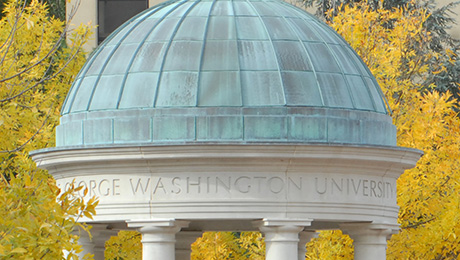The George Washington University Board of Trustees approved the university’s fixed tuition program for the 10th year in a row at Friday’s meeting, guaranteeing that tuition prices will not go up for returning undergraduates and that increases in cost of attendance will be limited to no more than 3.4 percent for incoming undergraduates in the 2014-15 academic year.
This is the seventh year in a row that the university has limited increases in cost of attendance—which includes tuition, fees, room and board—to approximately 3 percent, which is lower than increases at most major private universities.
“Looking back at the fixed tuition program after 10 years, the board feels it has been a great success and a real benefit to parents and GW families,” said Nelson Carbonell, B.S. ’85, chairman of the GW Board of Trustees.
GW will set tuition for incoming undergraduates in fall 2014 at $48,700 annually for up to five years as long as students remain in good academic standing. Returning sophomores, juniors, seniors and fifth-year seniors will have no increases in tuition. Students from GW’s 2013 graduating class paid the same tuition all four years, while students at similar institutions experienced increases of up to 15 percent during the same period of time.
“This year, we mark a decade of giving our students the assurance that their tuition costs will stay the same throughout their undergraduate years. At the same time, we are once again keeping our tuition increase for new students close to inflation,” said George Washington President Steven Knapp. “In both these respects, we are maintaining our commitment to make GW accessible to students from all backgrounds.”
When it adopted its program in the 2004-05 academic year, GW became one of the first universities to embrace fixed tuition. Executive Vice President and Treasurer Lou Katz explained that the goal was to address mounting financial concerns from parents and take the guesswork out of tuition costs. With a fixed rate, GW offers parents a long-term look at expenses, as opposed to other universities that only provide bill projections on a year-to-year basis.
“We felt it was something we could do that was innovative while also addressing the concerns parents had then,” Mr. Katz said. “From the very beginning, it was positive from the parent perspective because they knew upfront what a GW education was going to cost.”
More universities are implementing similar financial measures. A National Association of Student Financial Aid Administrators analysis of U.S. Department of Education data from 2012-13 found more than 320 colleges offer some form of fixed tuition policies.
Mr. Katz said the university examines the marketplace and reviews financial figures each year to ensure fixed tuition is helping students.
“We are committed to this program,” he said. “I think you’re going to see more institutions doing what GW is doing.”
Fixed tuition also influences prospective students’ decision to enroll at GW. A survey of 1,163 undergraduates from the class of 2013 found that fixed tuition was a deciding factor for 71 percent of students, and nearly a quarter of those surveyed believed it played a major role in their decision. A large majority of first-generation college students said the program was a significant reason they ultimately came to GW.
“Given the increasing cost of higher education, members of the GW community can be reassured that GW the university is committed to providing an excellent education without increasing the price of your most valuable asset—a GW degree,” said Hon. Angela G. Iannacci, president of the GW Parents’ Association Advisory Council.


